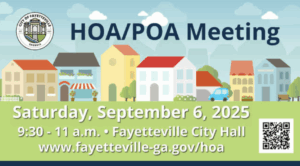A federal court judge’s denial of a new district voting map for the Fayette County Board of Education is being appealed to the 11th Circuit Court of Appeals.
The appeal is being sought by the Fayette County and national branches of the National Association for the Advancement of Colored People, which wants district voting to replace the current at-large voting scheme to make it easier for a black person to be elected to both the county Board of Education and the Fayette County Commission.
The crux of the appeal is whether or not the law requires the new district voting map to include a majority-minority district that has a black voting age population of greater than 50 percent. A map approved by the board of education in a proposed settlement with NAACP contained one district with 46.2 percent of its voting age population being black residents.
The NAACP claims that the 50 percent mark is only used to measure whether the vote dilution claim under Section 2 of the Voting Rights Act is legitimate. The group’s expert was able to draw an “illustrative” five-district map that includes one district with more than 50 percent of its voting age population being black residents, according to the filing from NAACP attorneys Ryan Haygood and Wayne Kendall.
Attorneys representing the county commission contend that the illustrative map was gerrymandered, thereby rendering it illegal.
Last month, U.S. District Court Judge Timothy C. Batten Sr. ruled that the consent map did not meet the legal requirement established in case law by the U.S. Supreme Court since it did not create a district in which the majority of the voting age population is black.
That ruling did not conclude the lawsuit, rather it came during a hearing in which the NAACP petitioned the district voting map to be enforced for the upcoming July BoE elections.
The NAACP in a brief filed June 8 claims that even with the largest minority voting age population in one district being 46.2 percent, the proposed district voting map would virtually assure the election of a black candidate.
In court during a May hearing, Haygood argued that the settlement map proposed by the NAACP and BoE, combined with district voting, would have allowed for Laura Burgess, a black college professor, to be elected to the BoE’s District 5 post in 2010.
A district voting scheme to elect board of education and county commission candidates would be a dramatic shift from the current procedure for electing members to those boards. The current at-large voting system allows voters to cast ballots for all five seats on both boards.
By contrast, a district voting scheme would limit voters to casting a ballot for just one of the five seats on each board: the one which corresponds with the geographic district the voter lives in.
The Fayette County BoE chose to settle the NAACP lawsuit by adopting the map, which was initially approved by the federal court earlier this year before it was overturned on the basis that the county commission, also a defendant in the lawsuit, had not agreed to it.
The county commission, which hired a firm that specializes in Voting Rights Act cases, has chosen to fight the district voting lawsuit. The BoE, meanwhile, chose to settle the lawsuit after taking advice from its contracted attorney, Phil Hartley.
The county is being represented by the firm of Strickland, Brockington and Lewis.










Leave a Comment
You must be logged in to post a comment.